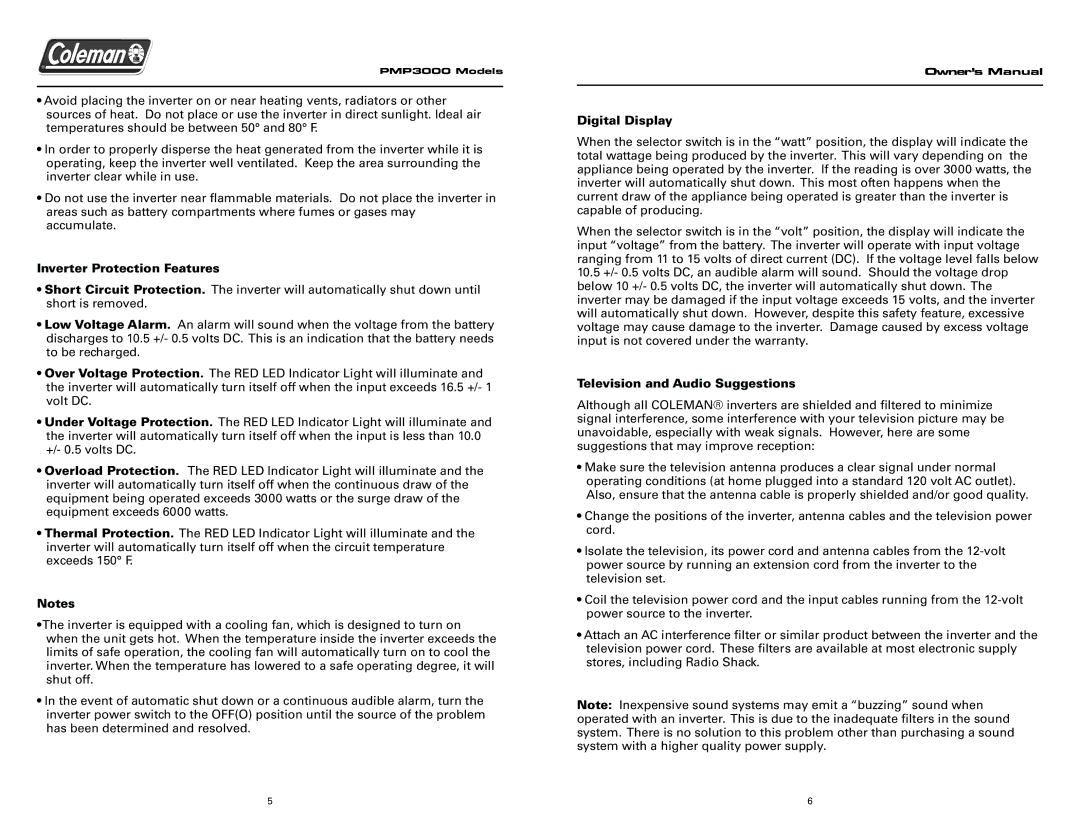PMP3000 Models
•Avoid placing the inverter on or near heating vents, radiators or other sources of heat. Do not place or use the inverter in direct sunlight. Ideal air temperatures should be between 50° and 80° F.
•In order to properly disperse the heat generated from the inverter while it is operating, keep the inverter well ventilated. Keep the area surrounding the inverter clear while in use.
•Do not use the inverter near flammable materials. Do not place the inverter in areas such as battery compartments where fumes or gases may accumulate.
Inverter Protection Features
•Short Circuit Protection. The inverter will automatically shut down until short is removed.
•Low Voltage Alarm. An alarm will sound when the voltage from the battery discharges to 10.5 +/- 0.5 volts DC. This is an indication that the battery needs to be recharged.
•Over Voltage Protection. The RED LED Indicator Light will illuminate and the inverter will automatically turn itself off when the input exceeds 16.5 +/- 1 volt DC.
•Under Voltage Protection. The RED LED Indicator Light will illuminate and the inverter will automatically turn itself off when the input is less than 10.0 +/- 0.5 volts DC.
•Overload Protection. The RED LED Indicator Light will illuminate and the inverter will automatically turn itself off when the continuous draw of the equipment being operated exceeds 3000 watts or the surge draw of the equipment exceeds 6000 watts.
•Thermal Protection. The RED LED Indicator Light will illuminate and the inverter will automatically turn itself off when the circuit temperature exceeds 150° F.
Notes
•The inverter is equipped with a cooling fan, which is designed to turn on when the unit gets hot. When the temperature inside the inverter exceeds the limits of safe operation, the cooling fan will automatically turn on to cool the inverter. When the temperature has lowered to a safe operating degree, it will shut off.
•In the event of automatic shut down or a continuous audible alarm, turn the inverter power switch to the OFF(O) position until the source of the problem has been determined and resolved.
Owner’s Manual
Digital Display
When the selector switch is in the “watt” position, the display will indicate the total wattage being produced by the inverter. This will vary depending on the appliance being operated by the inverter. If the reading is over 3000 watts, the inverter will automatically shut down. This most often happens when the current draw of the appliance being operated is greater than the inverter is capable of producing.
When the selector switch is in the “volt” position, the display will indicate the input “voltage” from the battery. The inverter will operate with input voltage ranging from 11 to 15 volts of direct current (DC). If the voltage level falls below
10.5+/- 0.5 volts DC, an audible alarm will sound. Should the voltage drop below 10 +/- 0.5 volts DC, the inverter will automatically shut down. The inverter may be damaged if the input voltage exceeds 15 volts, and the inverter will automatically shut down. However, despite this safety feature, excessive voltage may cause damage to the inverter. Damage caused by excess voltage input is not covered under the warranty.
Television and Audio Suggestions
Although all COLEMAN® inverters are shielded and filtered to minimize signal interference, some interference with your television picture may be unavoidable, especially with weak signals. However, here are some suggestions that may improve reception:
•Make sure the television antenna produces a clear signal under normal operating conditions (at home plugged into a standard 120 volt AC outlet). Also, ensure that the antenna cable is properly shielded and/or good quality.
•Change the positions of the inverter, antenna cables and the television power cord.
•Isolate the television, its power cord and antenna cables from the
•Coil the television power cord and the input cables running from the
•Attach an AC interference filter or similar product between the inverter and the television power cord. These filters are available at most electronic supply stores, including Radio Shack.
Note: Inexpensive sound systems may emit a “buzzing” sound when operated with an inverter. This is due to the inadequate filters in the sound system. There is no solution to this problem other than purchasing a sound system with a higher quality power supply.
5 | 6 |
